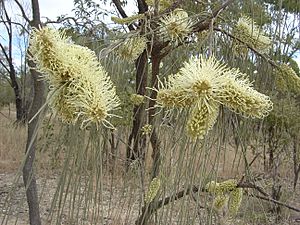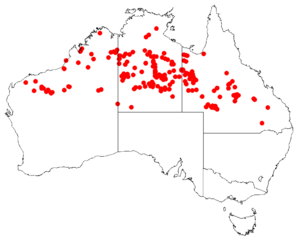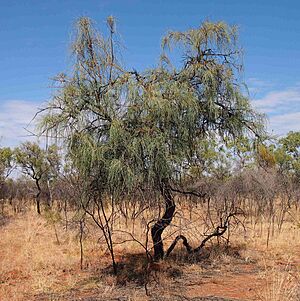Bootlace tree facts for kids
Quick facts for kids Bootlace tree |
|
|---|---|
 |
|
| Hakea chordophylla foliage and flowers | |
| Scientific classification |
|
| Kingdom: | Plantae |
| Clade: | Tracheophytes |
| Clade: | Angiosperms |
| Clade: | Eudicots |
| Order: | Proteales |
| Family: | Proteaceae |
| Genus: | Hakea |
| Species: |
H. chordophylla
|
| Binomial name | |
| Hakea chordophylla |
|
 |
|
| Occurrence data from Australasian Virtual Herbarium | |
| Script error: The function "autoWithCaption" does not exist. | |
Script error: No such module "Check for conflicting parameters".
Hakea chordophylla, also called the bootlace oak or corkwood, is a cool plant from the Proteaceae family. It grows as a shrub or small tree in central and northern Australia. This plant is known for its bright, showy flowers. They can be golden yellow, pale green, or cream. These flowers are full of nectar and bloom in winter.
Contents
What is Hakea chordophylla?
Hakea chordophylla is a type of shrub or small tree. It usually grows between 2 and 6 meters (7 to 20 feet) tall. Its trunk has thick, cork-like bark with many grooves. The branches often twist and turn.
Leaves and Flowers
This plant has long, tough leaves that look like needles. They can be 22 to 42 centimeters (9 to 16 inches) long. The leaves are quite thick, about 1.6 to 2.9 millimeters wide.
The plant produces many small flowers, usually 35 to 70 of them. These flowers grow in clusters called racemes. The racemes are 7 to 13 centimeters (3 to 5 inches) long. The flowers can be yellow, green, or cream colored. They bloom from June to August.
Fruit
After flowering, Hakea chordophylla produces large, smooth fruits. These fruits are shaped like an egg and are 2.6 to 4 centimeters (1 to 1.6 inches) long. They have a curved, beak-like tip.
How it Got its Name
The Hakea chordophylla was first officially described in 1857. This was done by a botanist named Ferdinand von Mueller. He found the plant material near Sturt Creek in the Northern Territory.
Meaning of the Name
The name chordophylla comes from Ancient Greek words. "Chorde" means "string" or "rope." "Phyllon" means "leaf." So, the name describes its long, string-like leaves. This plant belongs to a group of Hakea species known as "corkbarks." Most of these plants are found in the dry, inner parts of Australia.
Where it Grows
Hakea chordophylla is found across central and northern Australia. You can see it from western Queensland all the way to northern Western Australia. It grows in areas with spinifex grass, woodlands, and scrublands. It likes stony or red-brown sandy soil.
Growing this Plant
This hakea is a slow-growing plant, but it's very attractive. Its unique leaves and bark make it special. If you want to grow it, it needs lots of sunshine. It also needs soil that drains water well.
 | William L. Dawson |
 | W. E. B. Du Bois |
 | Harry Belafonte |


